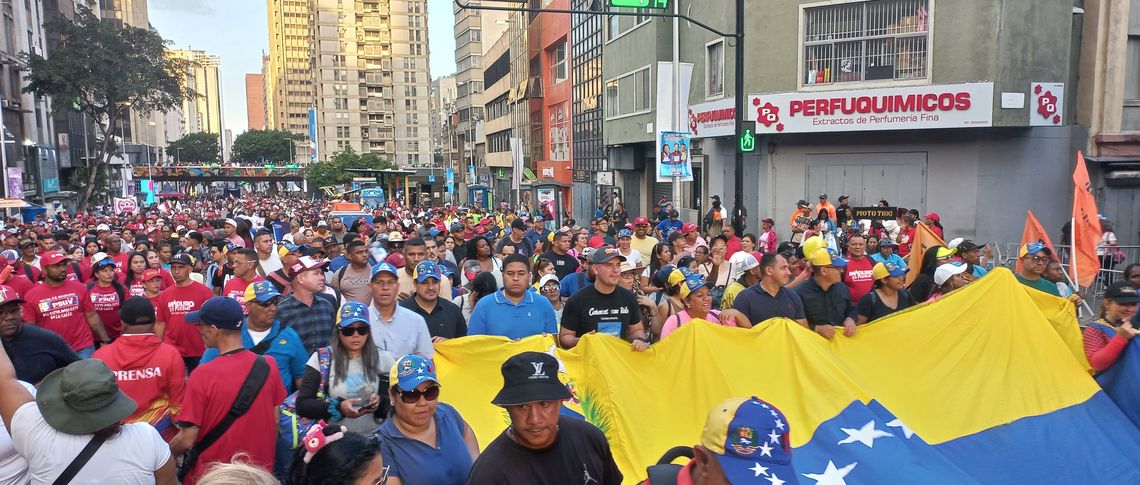On 26 May, Venezuela held parliamentary and regional elections. Repression, voter abstention and disunity among the opposition parties led to a decisive victory for the ruling party, thereby cementing the status quo. The region must act before it’s too late.
The preliminary results announced by the National Electoral Council just before midnight on 25 May were unambiguous: candidates from the ruling United Socialist Party of Venezuela (PSUV) won 23 out of 24 governor posts. Only one opposition incumbent managed to retain their seat. In three other states previously governed by the opposition – including Zulia, the country’s most populous and oil-rich state – PSUV candidates won by significant margins.
In the parliamentary election, the three opposition parties garnered just under 15 per cent of the total vote. This translates to 29 of roughly 285 seats (as of 26 May). According to official figures, voter turnout was higher than expected at 42.63 per cent. However, reports from individual polling stations suggest turnout may have been much lower.
The elections and the circumstances surrounding them reveal a regime that is tightening its grip on power — a process orchestrated by President Nicolás Maduro’s inner circle. Although the opposition has posed little meaningful challenge since Maduro’s inauguration on 10 January, arrests and threats have continued. During the presidential election of 28 July 2024, the government misjudged the opposition’s ability to organise and mobilise. Now, it is determined not to repeat that mistake.
In search of new allies
This internal pressure is accompanied by foreign policy offensives. In May, Maduro visited Moscow, where he not only celebrated 80 years of Russian-Venezuelan relations with President Vladimir Putin, but also discussed deeper economic cooperation. Economic matters were also at the heart of Vice President Delcy Rodríguez’s visits to Qatar and China. Concern over the country’s economic future is mounting. Since the Trump presidency disrupted Venezuela’s reliable love-hate relationship with the United States, Caracas has been under pressure to find new allies. Whether these diplomatic overtures will genuinely help lift Venezuela out of isolation remains uncertain. Brazil’s veto last year already blocked the country’s bid to join the BRICS group.
Among these foreign policy initiatives is the election of a governor for the border region of Esequibo — territory recognised under international law as part of Guyana but claimed by Venezuela. Politicians from all sides frequently reference the issue rhetorically, but no serious action has followed so far. At stake are not so much lofty ideals like ‘the sovereignty of peoples’, but the region’s lucrative oil and gas reserves.
The election of a governor and a regional parliament for a territory not under Venezuelan control, by people who do not even live there, may seem absurd. But it underscores the government’s geopolitical ambitions and its efforts to test the limits of its power. Venezuela’s military capabilities are currently limited, making symbolic politics the instrument of choice. Still, the move was taken seriously by the Caribbean Community (CARICOM), the International Court of Justice and the United States, all of whom condemned it.
Effects on the region
Esequibo is just one, and not the most significant, regional repercussion of Venezuela’s crisis. Colombia has borne the brunt for years — most recently when Venezuela unilaterally cancelled all flights between Bogotá and Caracas during the election weekend, allegedly to prevent ‘the entry of spies and ringleaders’. Such actions have strained bilateral relations for years.
Despite this, the countries are closely intertwined. Venezuela depends on Colombian industrial goods, and Colombia needs Venezuelan oil. Colombia has taken in over three million Venezuelan migrants to date — more than any other country. The border region also faces security challenges, including the presence of the ELN guerrilla group, which can only be addressed through joint efforts. Historically, both countries feel particularly close due to their Bolivarian past.
In Venezuela, one might have to worry that a new form of authoritarianism – one with the face of the 21st century – is taking shape.
How a government deals with the Venezuelan regime also inevitably has domestic political repercussions. Whether it be justified debates about the extent to which one should cooperate with an authoritarian regime, whether as a weapon of the opposition for electoral purposes, as seen in Colombia, or as a divisive factor in left-wing ideological infighting, as in Brazil.
As if the current situation wasn’t bleak enough, the outlook is even darker. While democratic deficits abound across South America, none of the countries could be described as full-fledged dictatorships. After decades of military juntas, it was widely believed that such regimes were a relic of the past. Yet, in Venezuela, one might have to worry that a new form of authoritarianism – one with the face of the 21st century – is taking shape.
An equally undesirable scenario, however, would be the implosion of the already diminished ruling power circle. What appears united on the outside is not always so on the inside. Currently, no viable political force exists to fill a potential power vacuum. Venezuela is larger than Nicaragua and, unlike Cuba, not an island. It shares thousands of kilometres of border with Brazil and Colombia and controls a significant part of the northern coast. Although organised crime is currently contained or confined to border regions, it could rapidly expand if the government’s grip loosens. A failed state on the South American continent? No one wants to imagine that — and that explains how the region is currently reacting: not at all.
Time to act
After last year’s presidential elections, Brazil and Colombia made noteworthy efforts to engage the Venezuelan regime and support a democratic transition that would allow all sides to save face. The Venezuelan government rejected those overtures, and the dialogue has gone silent since Maduro’s inauguration. While that may be understandable, it is also dangerously short-sighted. Initiatives like the 2023 Barbados Agreement – which sought to exchange guarantees for free and fair elections for economic relief from the US – have failed. Given the recklessness with which the US government is currently acting internationally, a revival of such talks is not desirable.
Responsibility now lies with the region. After all, Venezuela’s neighbours have a vital interest in preserving peace and stability. All available channels must be explored: quiet diplomacy, cooperation in science and culture, support for civil society and economic partnerships. As fragile and ambivalent as the family of progressive left-wing actors on the continent may be, they too can play a role — if they can finally move beyond the simplistic ‘for or against’ dichotomy and adopt a more nuanced view of Venezuela.
Existing spaces for action must be identified and strengthened. Every opportunity to de-escalate tensions and foster a democratic environment must be seized — preferably without the glare of the international spotlight.






